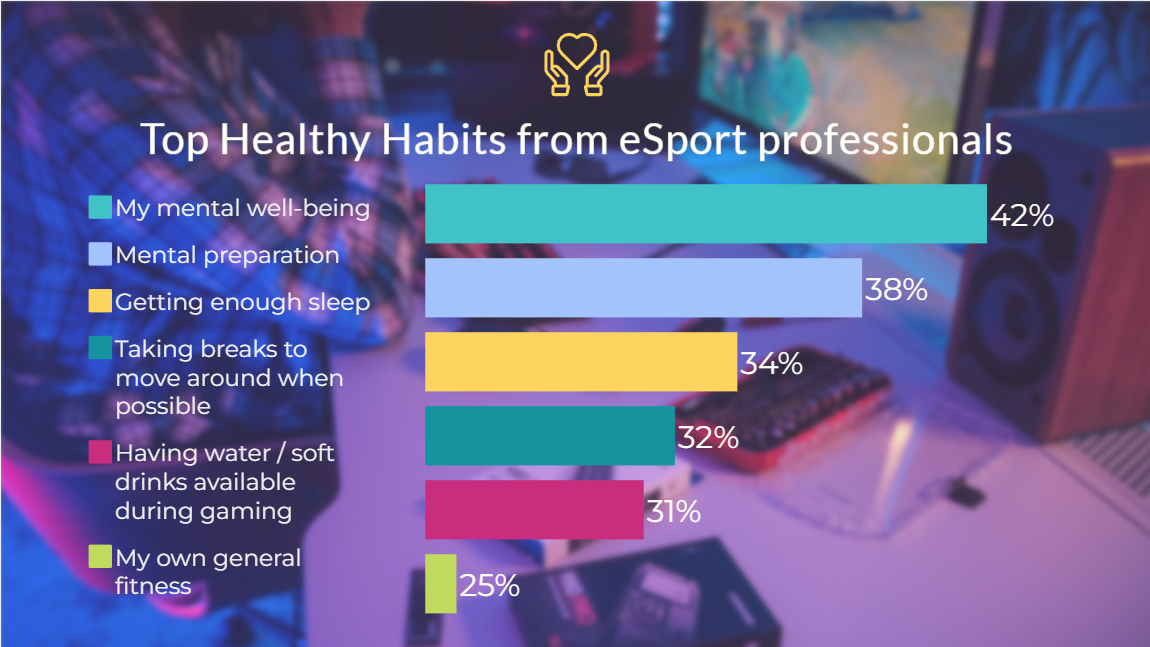A survey, commissioned by Kaspersky, revealed good mental health is one of the biggest factors affecting professional gamers, with eSport pros (42%) most worried about their mental condition than other gamers.
Pro gamers pay strong attention to healthy habits and lifestyle – 38% take care of proper mental preparation and 34% don’t forget to get enough sleep. Only 40% of eSport pros would rather keep playing to improve performance than take more breaks for sleep or eat healthier food.
According to a recent study, devoted to the predictors of mental ill health in eSport amongst competitors, conducted by University of Winchester, it is highly prevalent with eSports athletes at a level comparable to other professional sports, such as football. Results also show that pro gamers can face sleep issues, burnout, and social phobia anxiety.
The Kaspersky survey proves that professional gamers – more than others – worry about mental health, and 82% of eSport pros agree well-being is essential for top performance in gaming.

In addition, professional gamers more responsibly treating their health. In particular, eSport pros mostly pay attention to healthy habits – 34% think about getting enough sleep, 38% don’t forget about their mental preparation, and 32% taking breaks to move around when possible.
Also, 40% of eSport pros would agree to keep playing, instead of taking more breaks for sleep or eating healthier food to improve their performance. In comparison, 59% of top gaming influencers would prefer playing than have healthy breaks.
“The competition level in gaming championships is extremely high, and sometimes is even like a real sport. To fight for leading positions, professional gamers spend a lot of time thoroughly preparing. In addition to the hard skills within specific games, soft skills play a big role in winning. Our survey research shows 82% of pro gamers agree that for them it’s mental well-being,” commented Marina Titova, Vice-President, Consumer Product Marketing at Kaspersky.
Kaspersky also recently launched ‘hacker:HUNTER ‘Next Level’, a six-part documentary series in co-production with Euronews, devoted to online gaming, esports and the pertinent security issues around them. The episode ‘The Darker Side of Esports: How Players Cope Under Pressure’ is devoted to the mental health challenges with which professional gamers have to cope. The episode is available on Tomorrow Unlocked channel via this link.
In order to maintain high-level computing performance and healthy system security, Kaspersky recommends the following:
- Beware of phishing campaigns and unfamiliar gamers. It’s a good option to double-check the website you are redirected to via the link in the received email and the extension of a file you are going to open.
- It’s safer to buy games only on official sites and wait for the sales — they regularly take place, so you won’t be sitting on your hands for long.
- Reliable security solutions can support specific modes, created for gamers. For instance, “Gaming” and “Do not Disturb” modes in new Kaspersky solutions turn on automatically while users are gaming, watching movies or on a video call, and turn off when they are done. When apps intended for work, study or play are used, the relevant mode activates itself, hiding tasks and notifications. Users only receive critical security alerts when their attention is required.
Within the report Kaspersky defined the following gamers’ categories:
- eSports Pros
See gaming performance as extremely or very important; have taken part in tournaments at least once in the last two years; are either building an income from gaming, or value making some money from it
- eSports Amateurs
Have taken part in tournaments at least once in the last two years and like taking part in tournaments and competitions; do NOT look for money making opportunities from their gaming
- Hardcore Gamers
Play at least 20 hours per week
- Gadget Gamers
Invest a high or very high sum of money to improve their gaming performance (hardware / training / nutrition, etc.)
- Gaming Influencers
Stream at least once a month; have a minimum of 1,000 followers
- Top Gaming Influencers
Stream at least once a week and have at least 10,000 followers
The full report is available via this link.

























